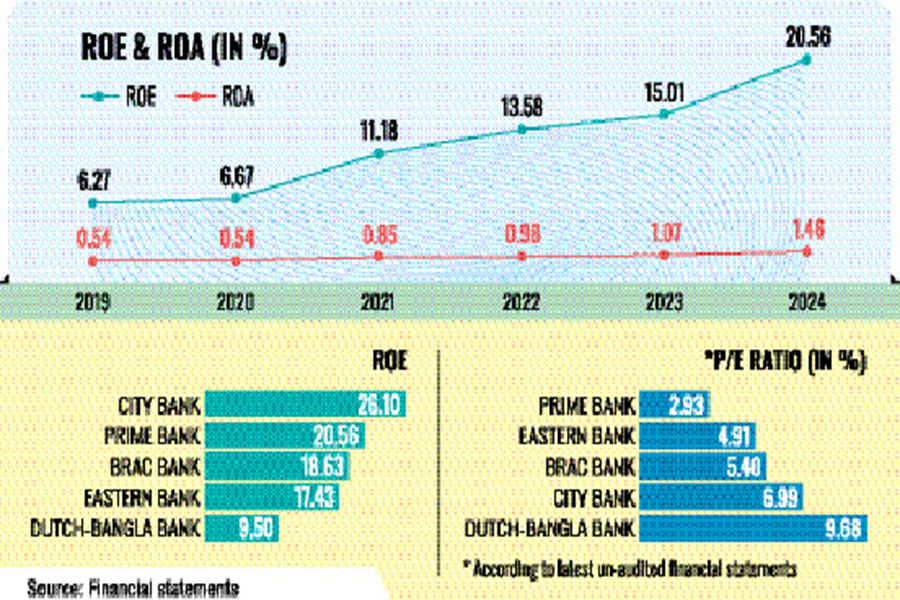Prime Bank earns 2nd highest against each taka invested among banks

Published :
Updated :

Prime Bank shows the second highest return on equity (ROE) among well-performing banks in its latest annual report but the stock still trades at the lowest price-to-earnings (P/E) ratio among listed banks on the bourses.
It posted an ROE of 6.27 per cent in 2019, meaning it generated a profit of Tk 6.27 against every Tk 100 of shareholders' equity. By 2024, the ROE surged to 20.56 per cent, reflecting significant gains in operating efficiency and profitability.
Prime Bank's ROE shows strong financial performance and could be an encouraging sign for investors, said Chief Executive Officer of VIPB Asset Management Shahidul Islam.
However, the market remains seller dominated. If the overall market condition improves and Prime Bank continues to sustain its profitability, its share price is likely to rise in the future.
ROE is a key metric for investors because it shows how efficiently a company uses shareholders' funds to generate profit. Simply put, it reflects the return earned on each unit of equity invested.
The growth in ROE not only indicates a better use of equity but also more effective asset utilization and financial leverage, compared to its competitors.
According to the bank's financial statements, its Return on Assets (ROA) was just 0.54 per cent in 2019, which increased to 1.46 per cent in 2024 -- nearly a threefold rise. This growth demonstrates a marked improvement in asset management and the bank's ability to generate profit from its asset base.
Prime Bank has also shown a better dividend yield, 7.48 per cent, than other well-performing banks, including BRAC Bank, Dutch-Bangla Bank, and Eastern Bank.
Despite Prime Bank's outstanding performance, its market valuation remains relatively low, as indicated by the industry average P/E ratio. Prime Bank's P/E ratio is 2.93 whereas the sector's P/E ratio is 5.42.
The low P/E ratio is suggestive of the stock's undervaluation.
The bank started witnessing erosion of its market value after a loan scam by Bismillah Group between 2011 and 2012.
Bismillah Group, a terry towel producer and exporter, embezzled a total of Tk 9.9 billion from five different banks, of which nearly Tk 3.26 billion was siphoned off from Prime Bank alone.
As a result, Prime Bank's profitability and dividend payouts declined sharply. Although it began to recover gradually after 2021, a notable turnaround occurred post 2023 when the bank focused on strengthening its human resources, an insider said.
It began hiring skilled professionals across its branches, including in its securities trading operations. A major driver of this transformation was the appointment of a new CEO who introduced a more modern and efficient banking model at Prime Bank, added the insider who requested not to be named.
In the latest quarter to March, Prime Bank secured a 59 per cent year-on-year growth in profit, riding on higher interest and investment income.
The second generation private commercial bank has reported Tk 2.09 billion in profit after tax on consolidated basis for the three months through March, up from Tk 1.32 billion in the same period a year ago.
Meanwhile, Prime Bank's stock rose 0.93 per cent to Tk 21.7 per share on June 4 on the Dhaka Stock Exchange.
farhan.fardaus@gmail.com


 For all latest news, follow The Financial Express Google News channel.
For all latest news, follow The Financial Express Google News channel.